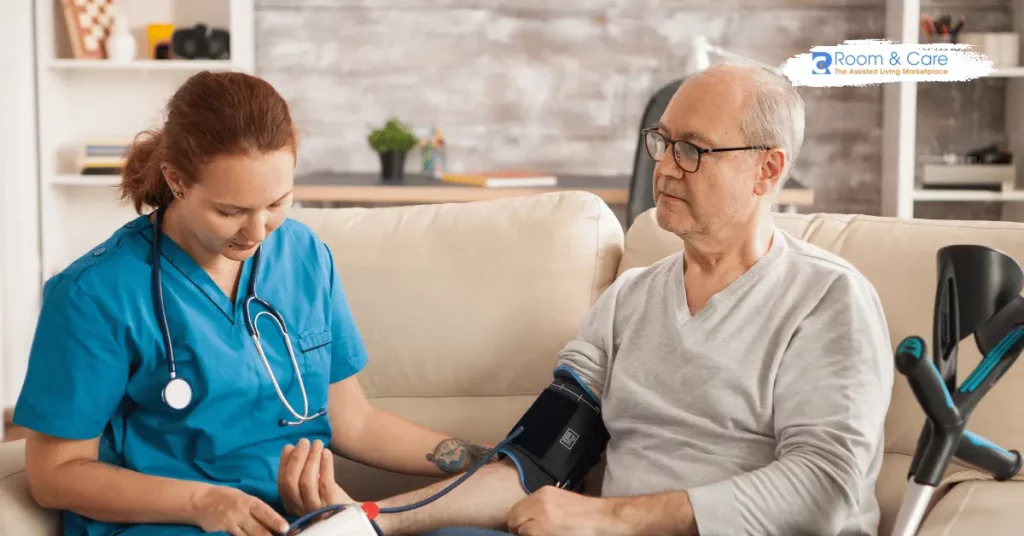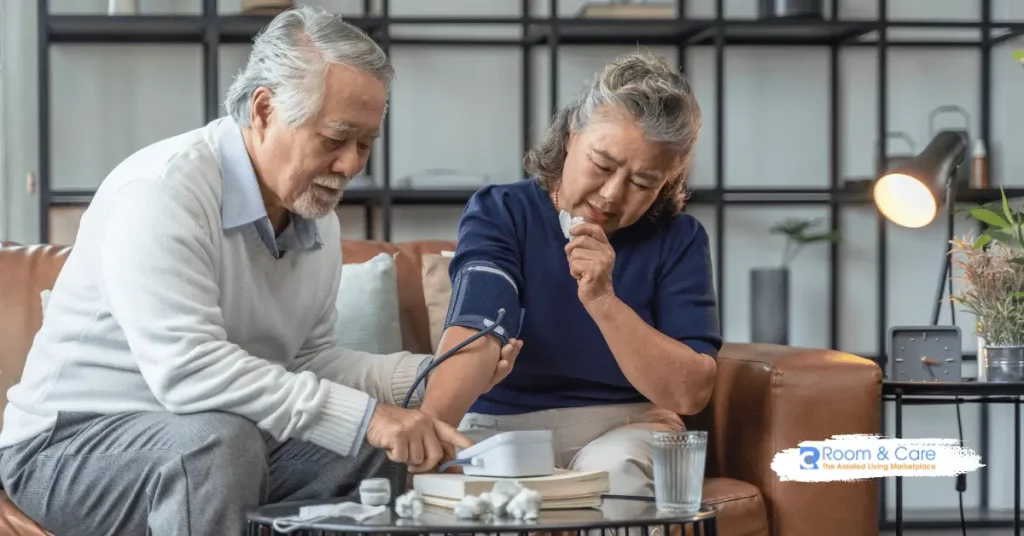

Maintaining normal blood pressure is essential for seniors as it plays a critical role in overall health and well-being. Blood pressure directly impacts heart health, brain function, and the body’s vital organs, making it a key factor in aging healthily. Understanding the ideal blood pressure range for seniors, along with steps to manage it effectively, can significantly improve quality of life.
In this guide, we’ll explore what constitutes normal blood pressure for seniors, key factors affecting it, practical tips for management, and how Adult Family Homes and Assisted Living Facilities can provide support. Let’s dive into the details.
Blood pressure is measured in millimeters of mercury (mmHg) and is expressed as two numbers: systolic pressure (the top number) and diastolic pressure (the bottom number). Systolic pressure measures the force exerted by the heart during a beat, while diastolic pressure measures the force in the arteries between beats.
For seniors, normal blood pressure generally falls within the range of 120/80 mmHg to 140/90 mmHg. This range accounts for age-related changes in blood vessels and overall cardiovascular health. Readings consistently higher than this range may indicate hypertension, while lower readings could signal hypotension.
Proper blood pressure management helps reduce the risk of complications such as heart disease, stroke, and kidney damage. Maintaining normal levels ensures optimal blood flow, which is vital for physical and cognitive health. Addressing high or low blood pressure promptly can prevent chronic conditions and improve longevity.
As people age, arteries naturally lose elasticity, leading to increased resistance and higher blood pressure. This makes monitoring more important as seniors grow older.
Diet, exercise, alcohol consumption, and smoking significantly affect blood pressure. A sedentary lifestyle and unhealthy eating habits can lead to hypertension, while regular physical activity and a balanced diet can help maintain normal levels.
Chronic conditions like diabetes, kidney disease, and heart disease often contribute to abnormal blood pressure. Managing these conditions effectively can stabilize blood pressure.
Medications prescribed for other ailments may influence blood pressure. Seniors should regularly consult their healthcare providers to adjust medications as needed.
Reduce Sodium: Limit salt intake to 1,500 mg per day or less. Choose fresh or low-sodium options whenever possible.
Increase Potassium: Incorporate potassium-rich foods like bananas, oranges, spinach, and sweet potatoes to balance sodium levels.
Adopt the DASH Diet: The Dietary Approaches to Stop Hypertension (DASH) diet focuses on whole grains, lean proteins, fruits, and vegetables, helping lower blood pressure effectively.
Engage in moderate physical activity for at least 30 minutes most days of the week. Activities such as walking, swimming, or yoga improve cardiovascular health and help regulate blood pressure.

Chronic stress can elevate blood pressure over time. Techniques such as meditation, deep breathing exercises, and mindfulness can effectively lower stress levels.
Home blood pressure monitors make it easy to track readings. Logging these readings can help seniors identify patterns and work with their healthcare providers for better management.
Quitting smoking and moderating alcohol intake can significantly lower blood pressure. Smoking damages blood vessels, while excessive alcohol consumption raises blood pressure.
Dehydration can lead to lower blood pressure, causing dizziness or fainting. Seniors should aim to drink enough water throughout the day to stay hydrated.
Adult Family Homes and Assisted Living Facilities provide tailored care plans that include regular monitoring of blood pressure and overall health. Trained staff ensure seniors follow healthy routines and adhere to medication schedules.
These facilities often provide heart-healthy meals designed to support blood pressure management. Residents benefit from balanced diets without the hassle of meal preparation.
Exercise is a cornerstone of healthy aging. Many facilities offer senior-friendly fitness programs, such as chair yoga, tai chi, and walking clubs, that promote cardiovascular health.
By handling day-to-day responsibilities like housekeeping and transportation, these facilities allow seniors to focus on their health and well-being without added stress.

A reading of 180/120 mmHg or higher is considered a hypertensive crisis and requires immediate medical attention. Symptoms may include severe headaches, chest pain, or shortness of breath.
Yes, low blood pressure (hypotension) can lead to symptoms like dizziness, fainting, and increased risk of falls. Persistent low readings should be evaluated by a doctor.
Seniors should check their blood pressure at least once a week or as advised by their healthcare provider. Regular monitoring helps detect abnormalities early.
Yes, these facilities provide regular health monitoring, medication management, and healthy lifestyle support, making it easier for seniors to maintain normal blood pressure.
Encourage Healthy Habits: Support your loved one in adopting a balanced diet and staying physically active.
Regular Checkups: Help schedule regular doctor visits for blood pressure monitoring and overall health assessments.
Promote Medication Adherence: Ensure seniors take prescribed medications as directed.
Consider Professional Care: Adult Family Homes and Assisted Living Facilities can provide the necessary support for seniors to manage their blood pressure effectively.
The care setting plays a vital role in ensuring seniors’ health needs are met. Room and Care helps families find suitable Adult Family Homes, Assisted Living Facilities, and other senior living options. By offering these services without referral fees or middlemen, Room and Care makes it easier to access high-quality care that supports blood pressure management and overall well-being.
Normal blood pressure for seniors is typically between 120/80 mmHg and 140/90 mmHg.
Factors like age, lifestyle, and chronic conditions influence blood pressure.
Practical steps such as a balanced diet, regular exercise, and stress management can help maintain healthy levels.
Adult Family Homes and Assisted Living Facilities offer invaluable support for seniors in managing blood pressure and overall health.
Room and Care simplifies the process of finding the right care options, ensuring quality and affordability.
Taking proactive steps to maintain normal blood pressure can significantly enhance seniors’ quality of life. Whether it’s adopting healthier habits, using home monitors, or considering professional care, every effort counts. Visit Room and Care today to explore options for senior living that prioritize health and happiness.